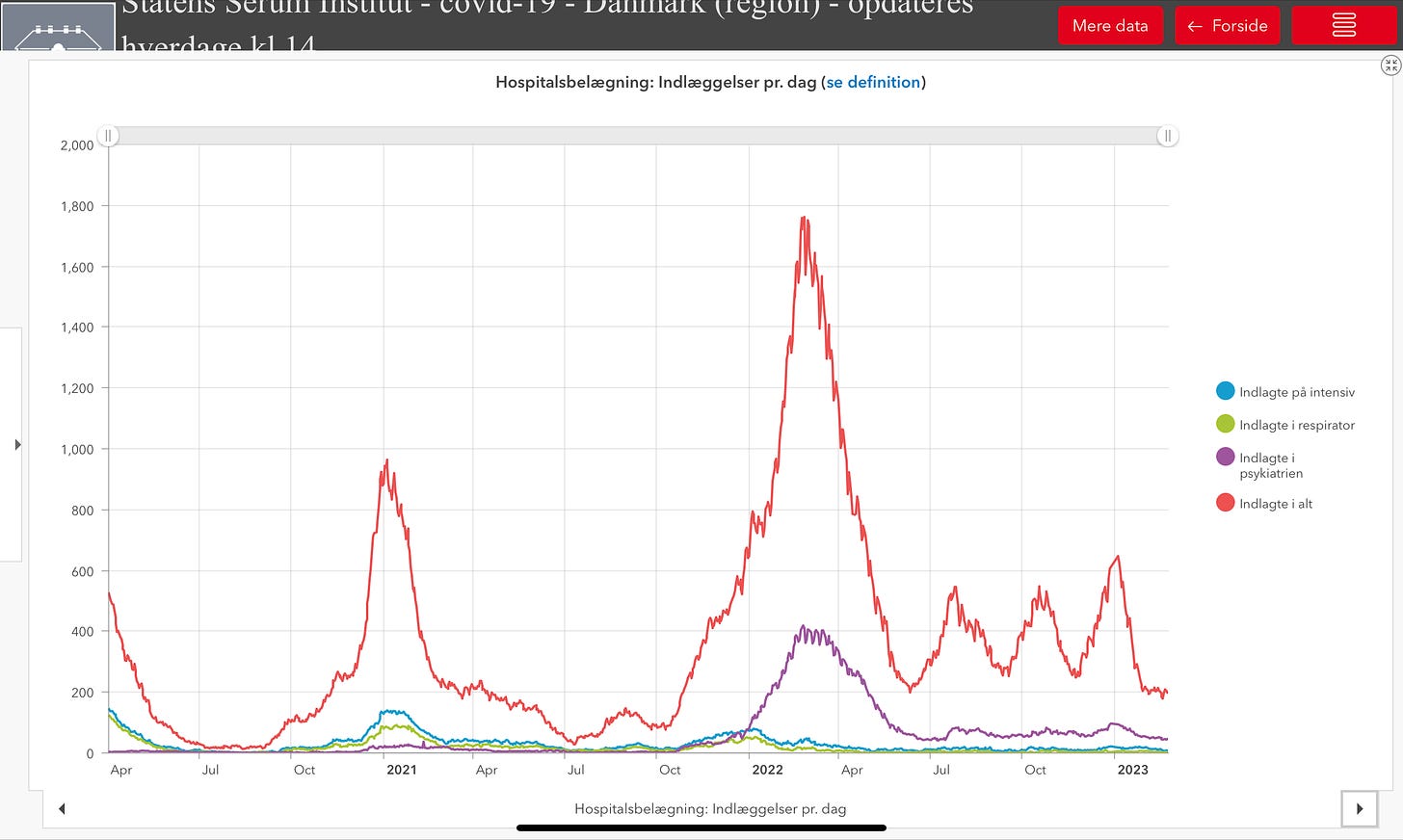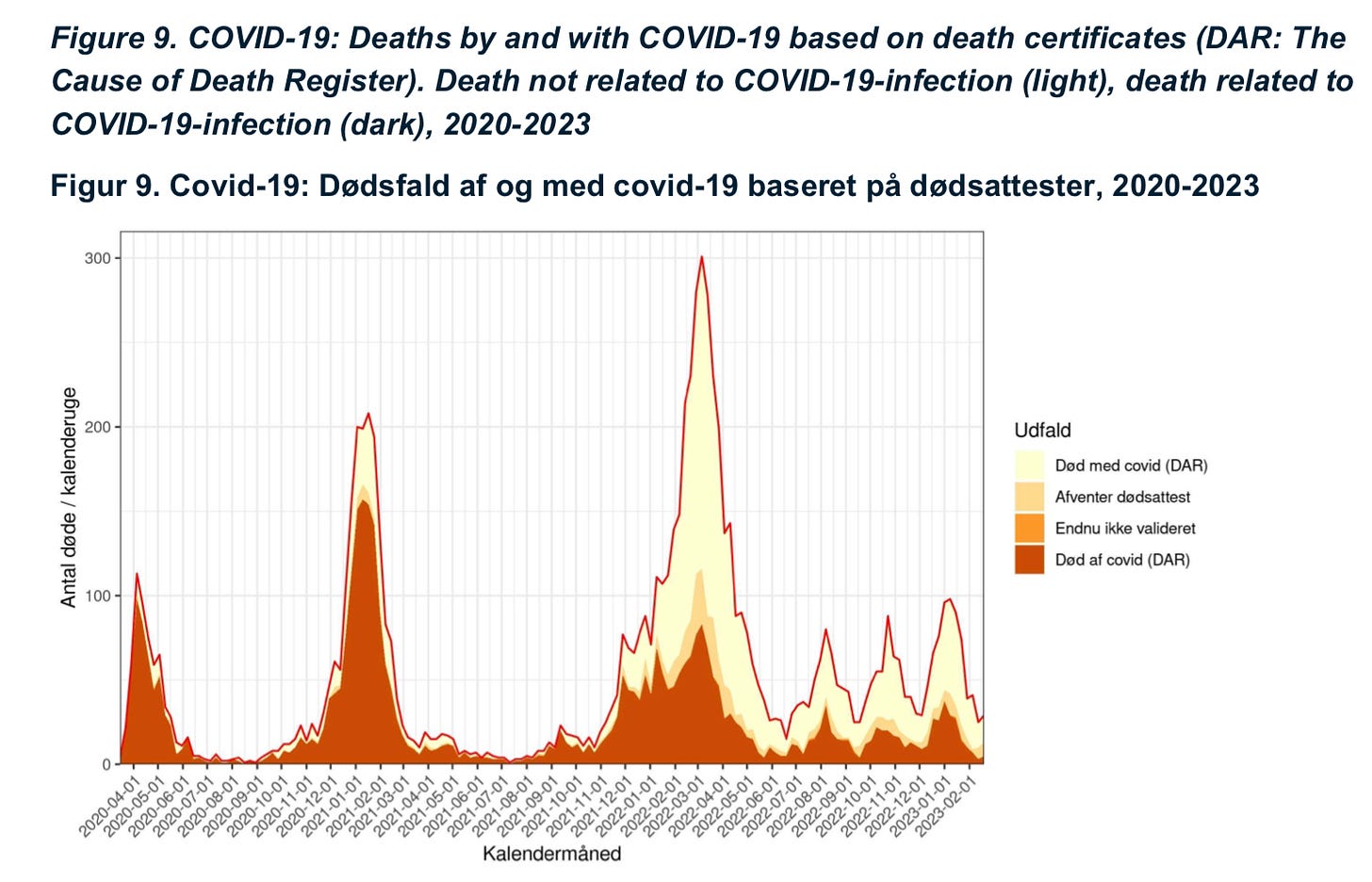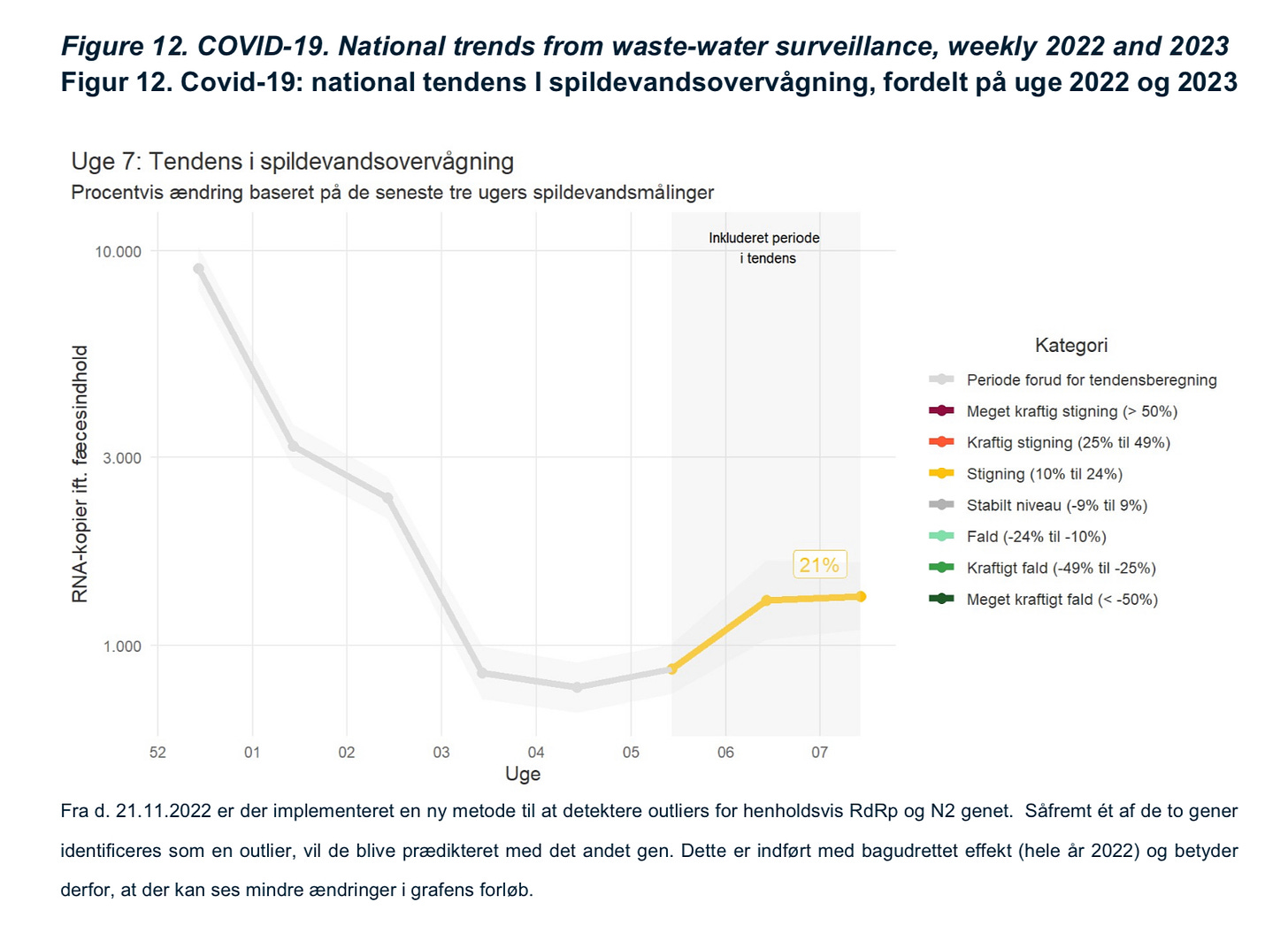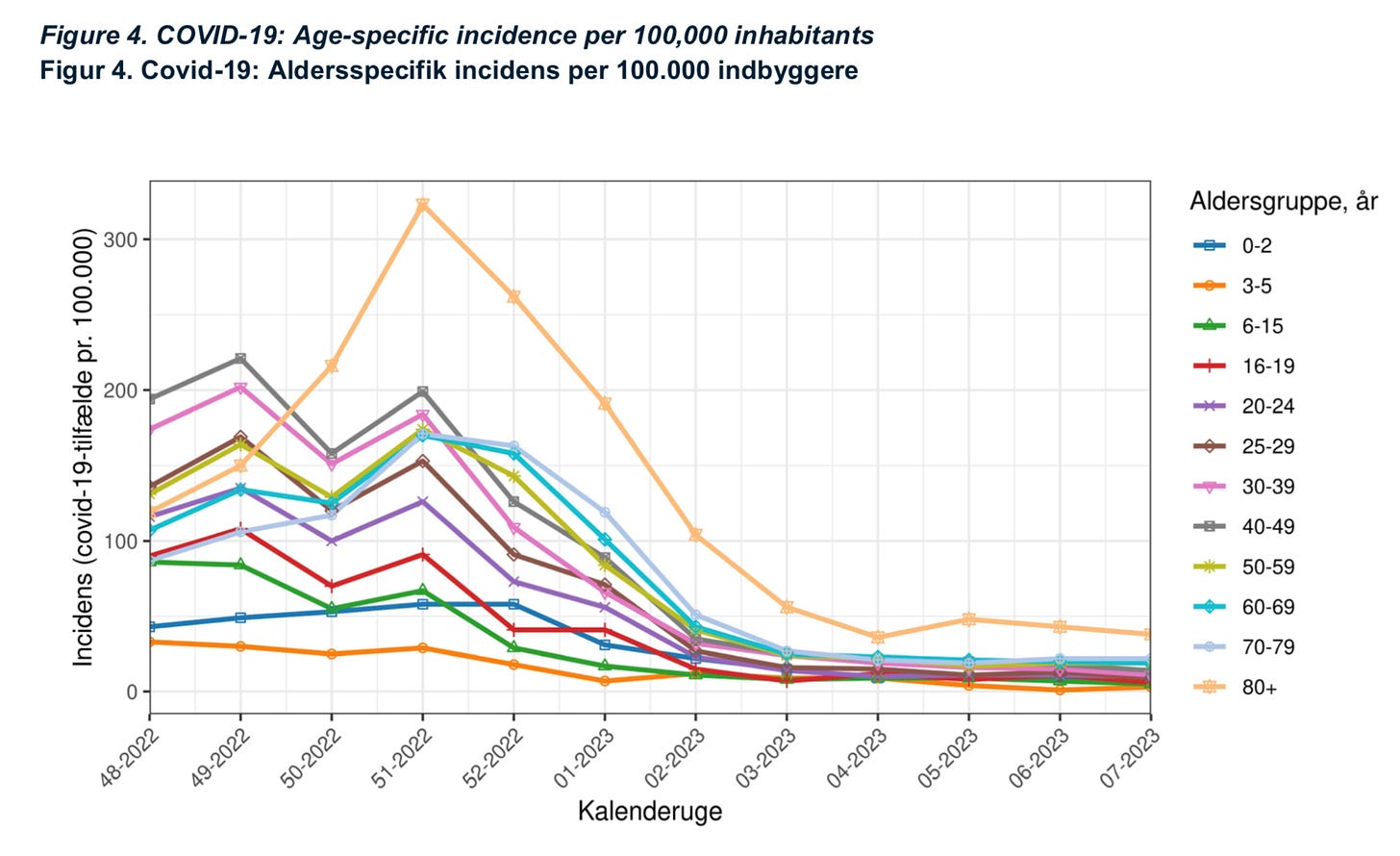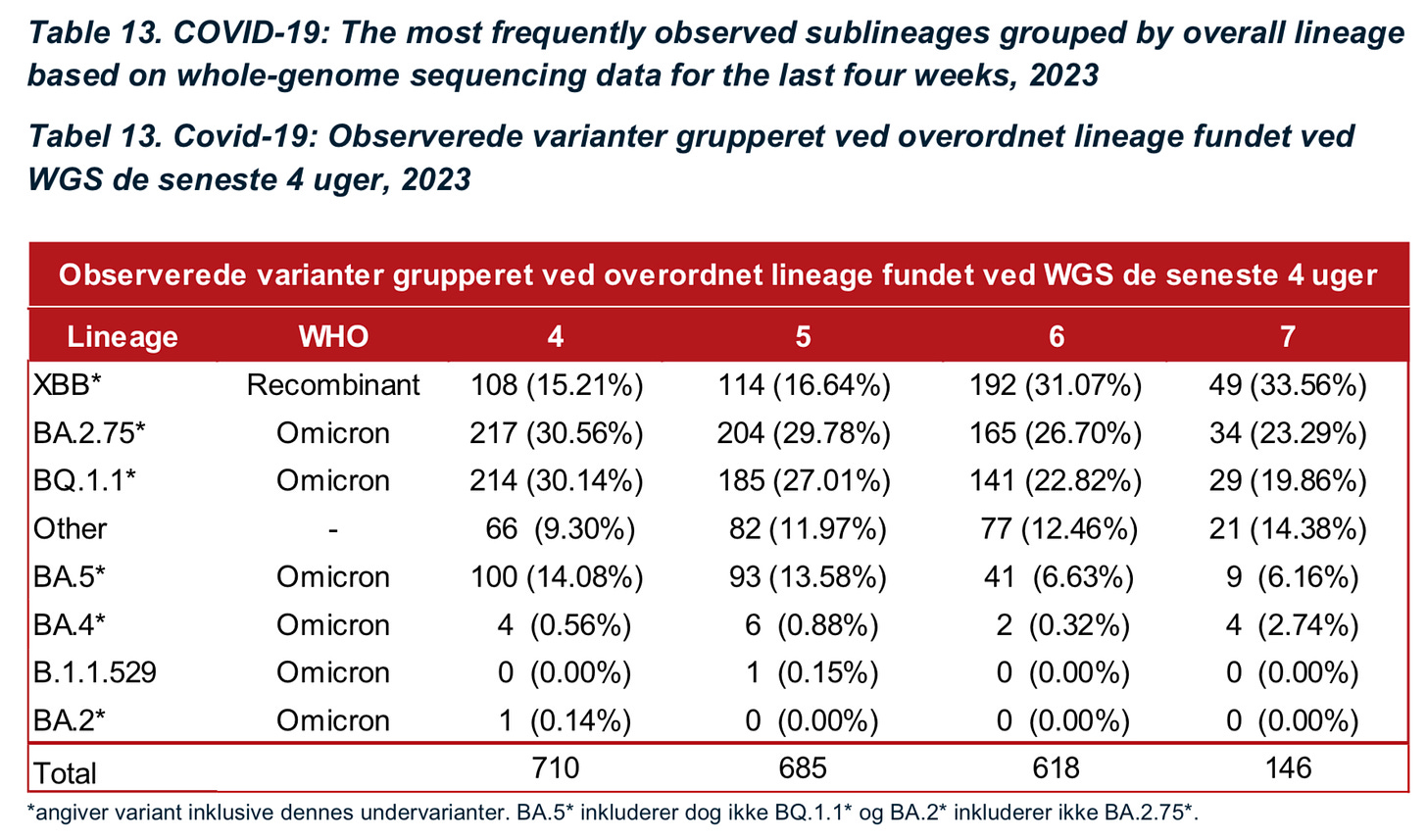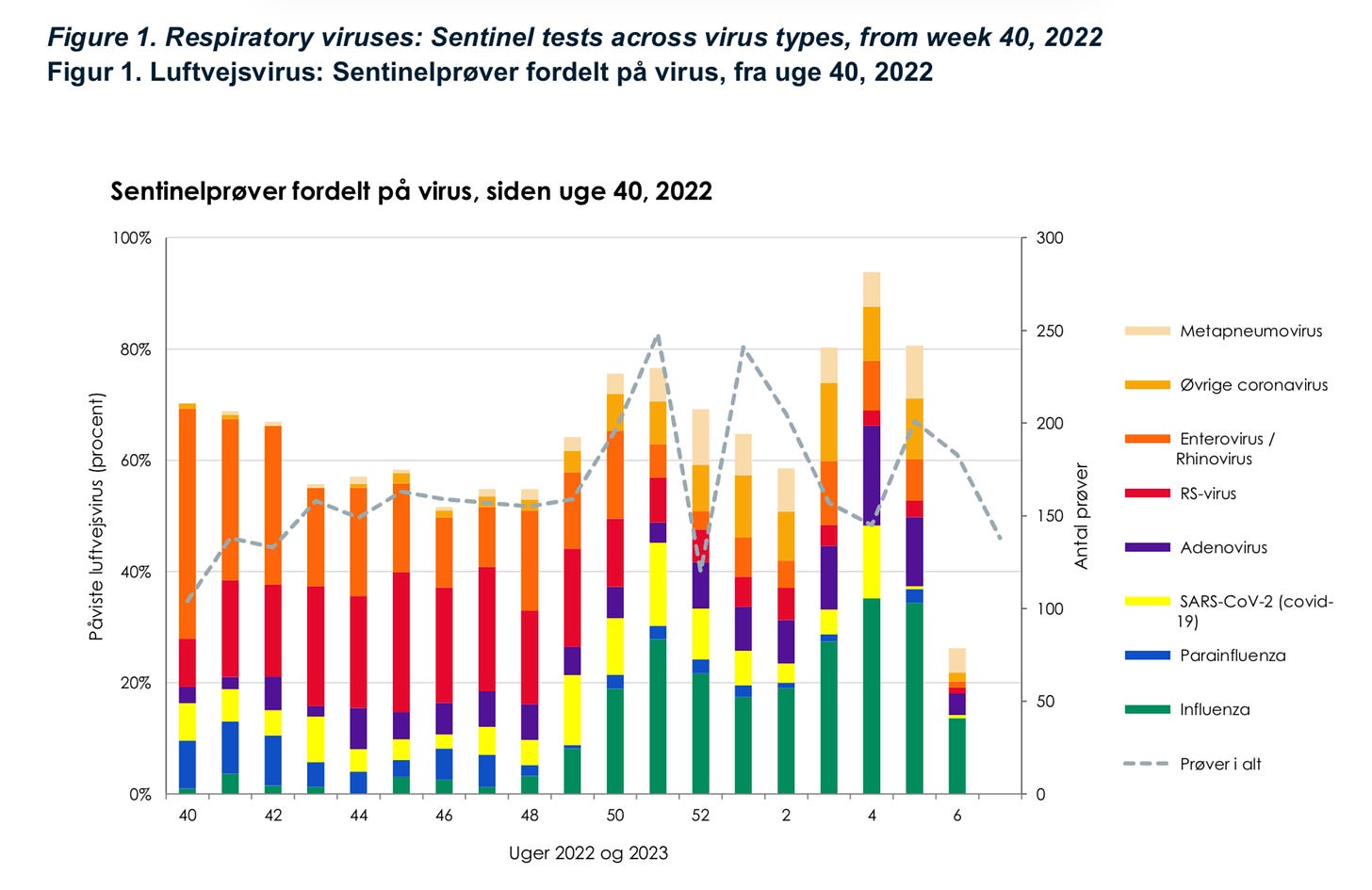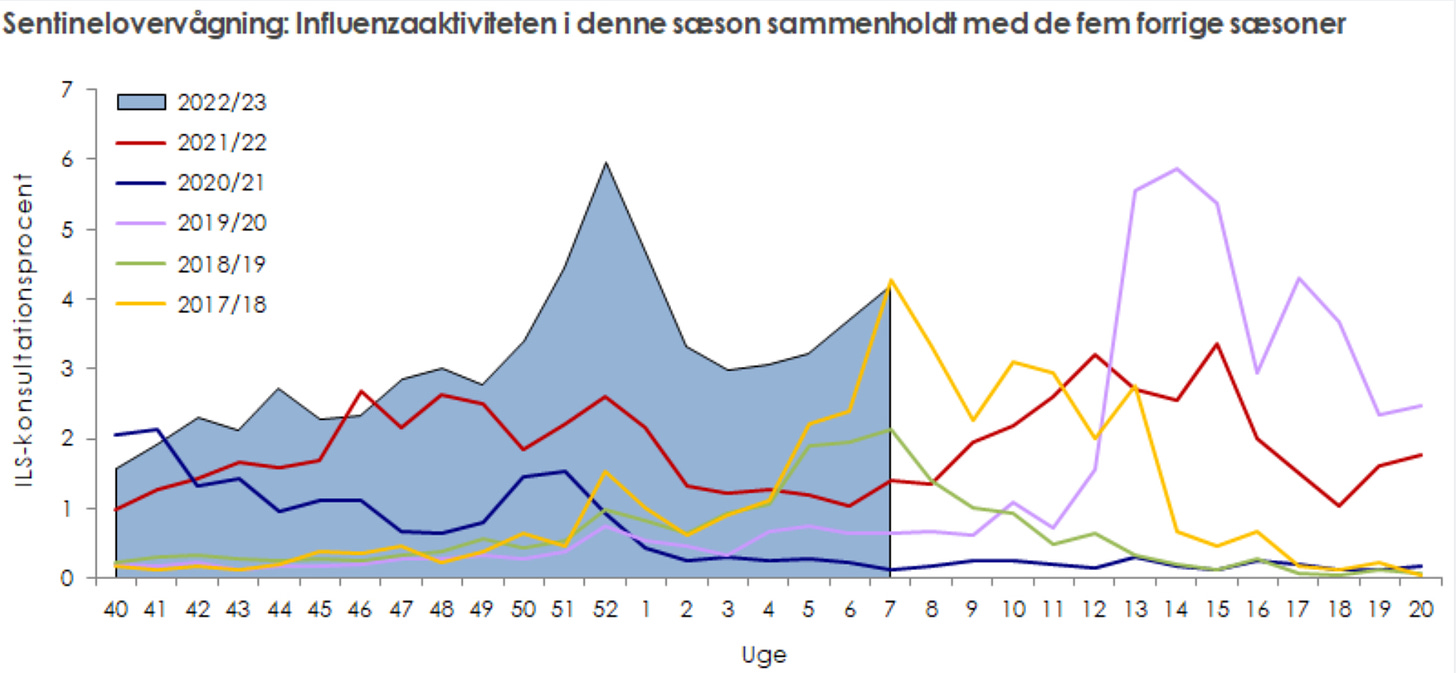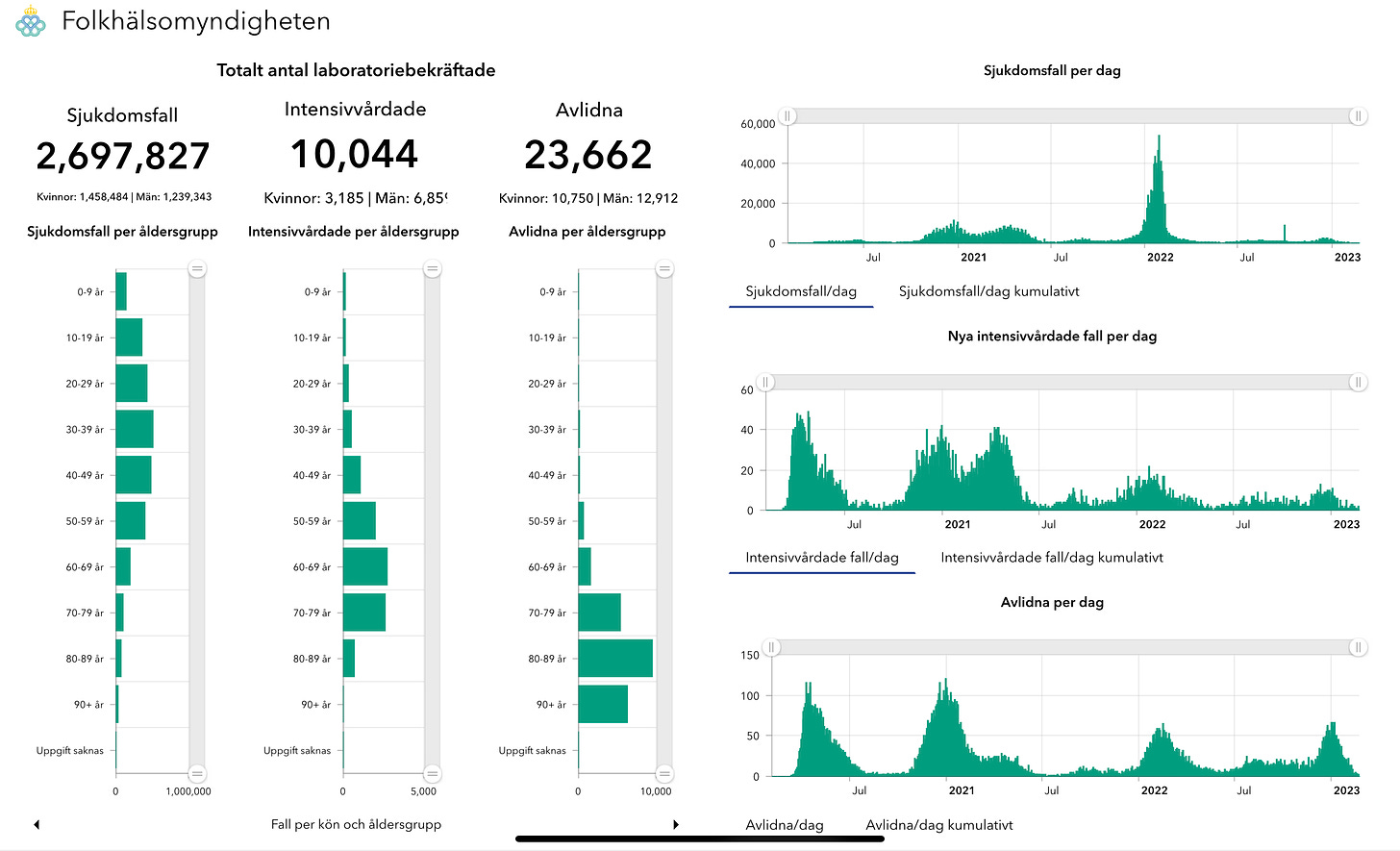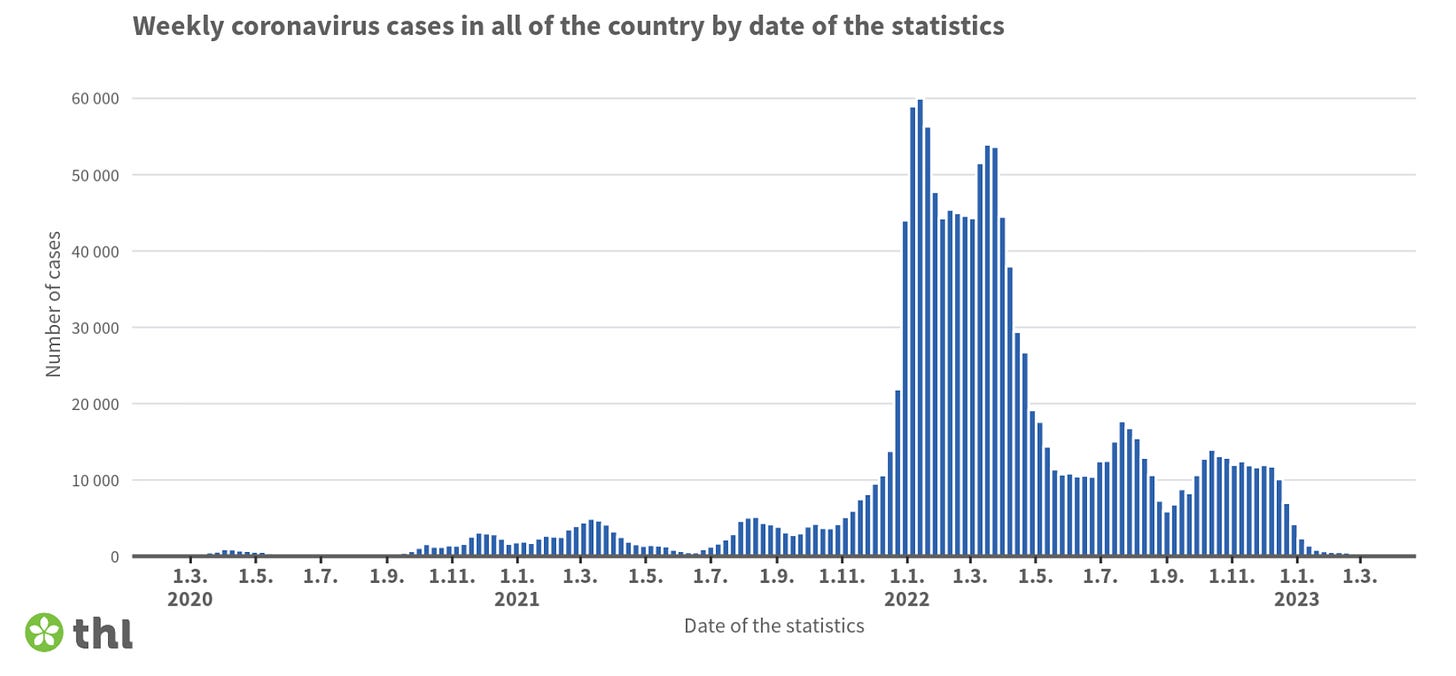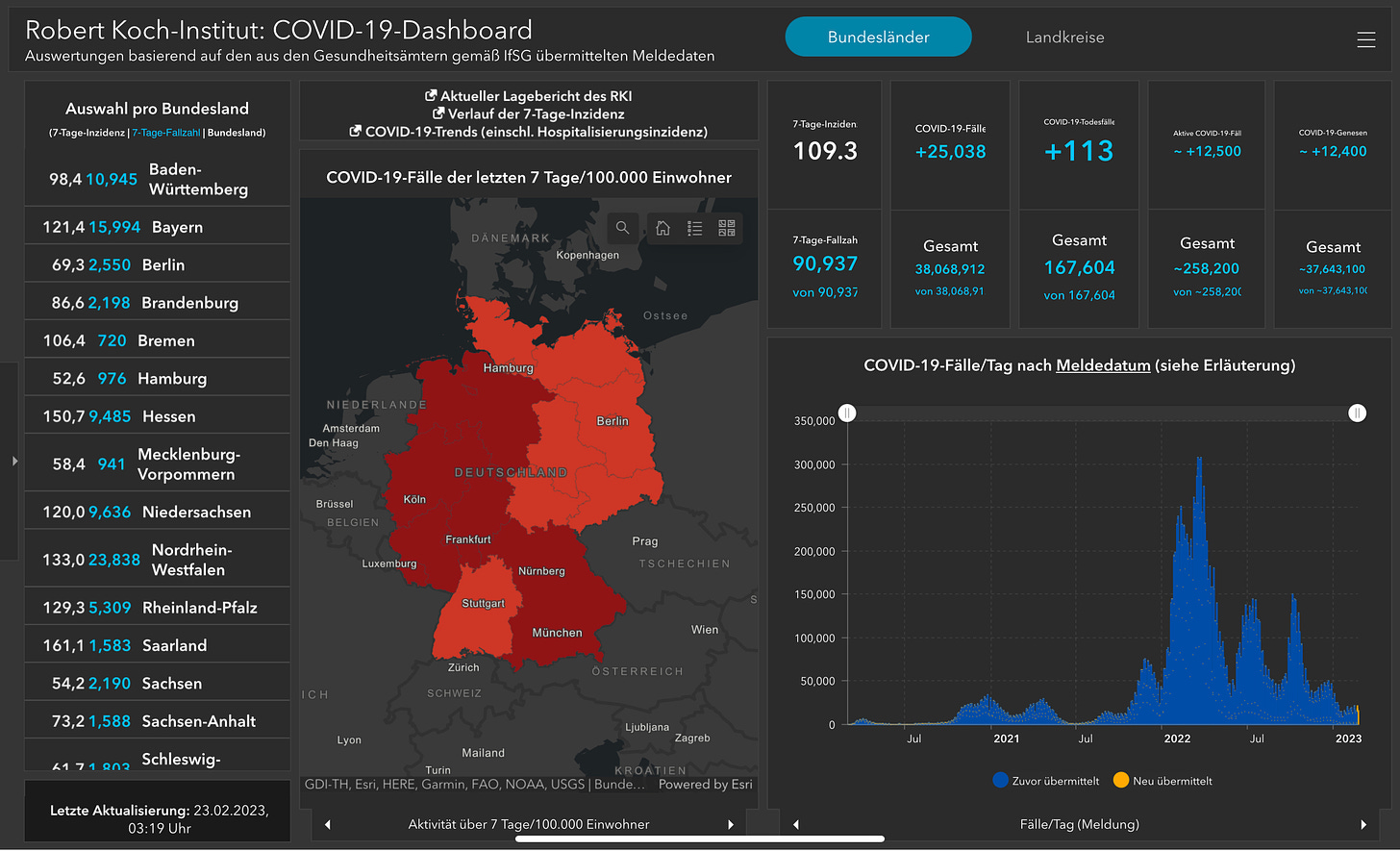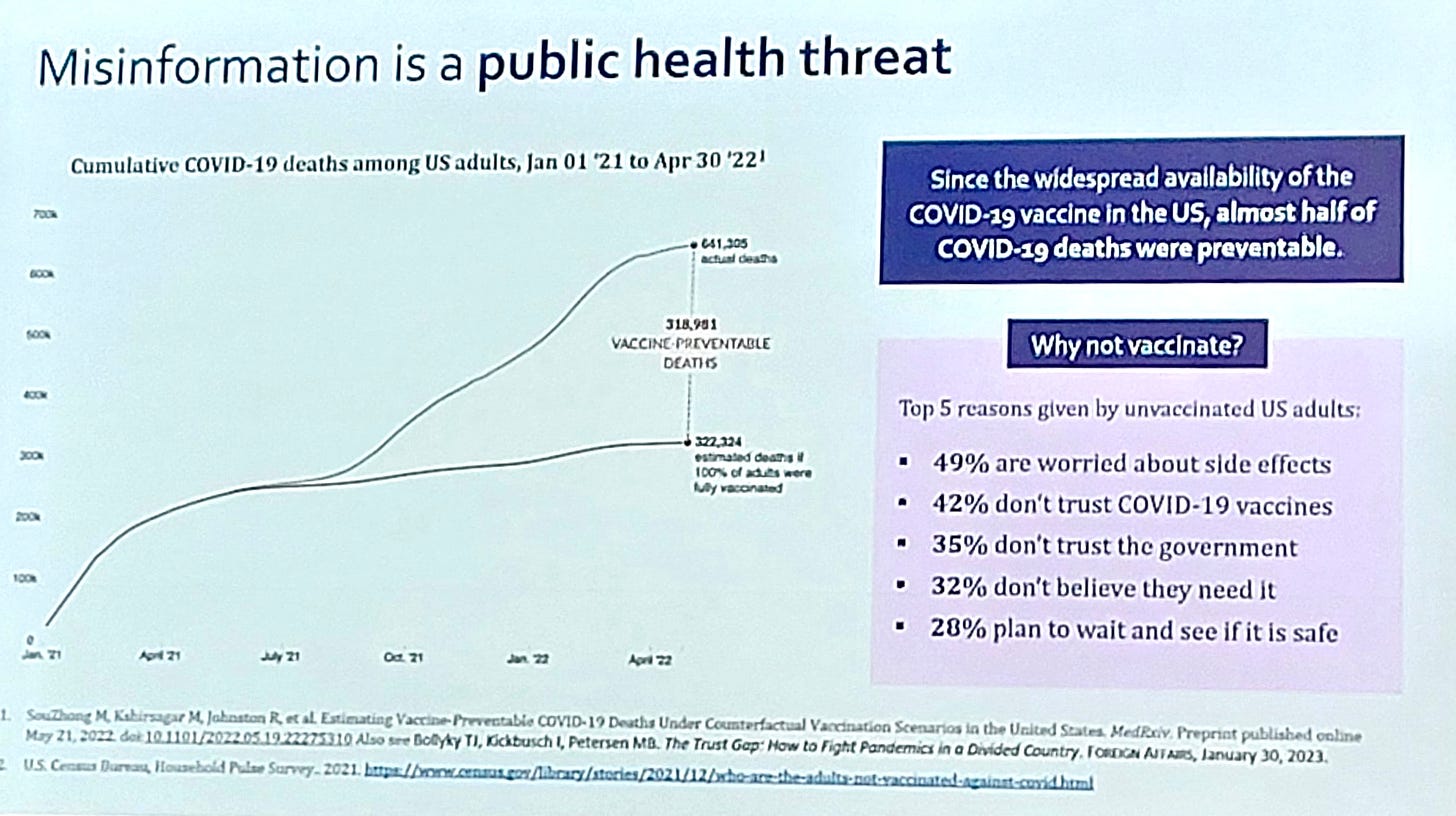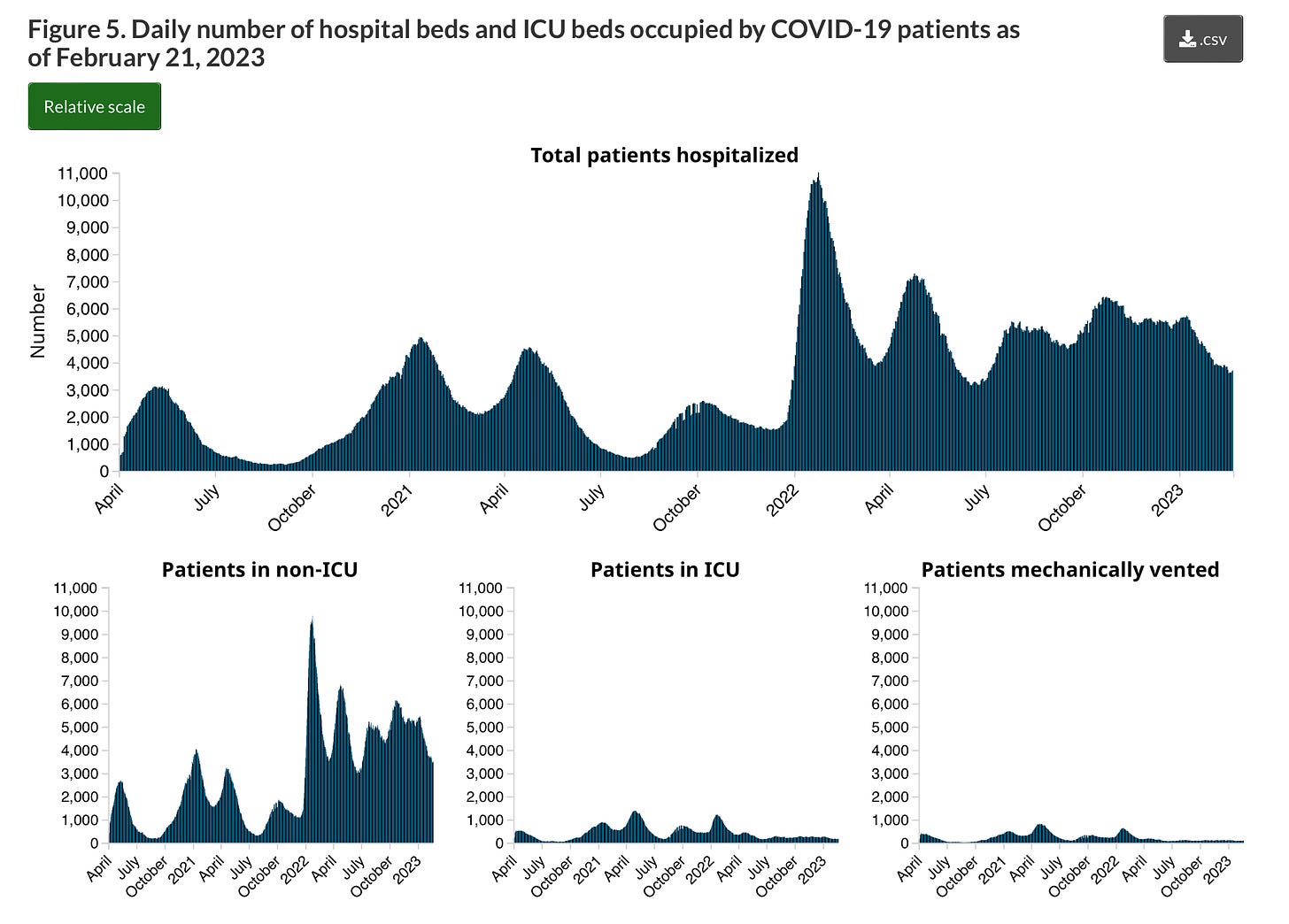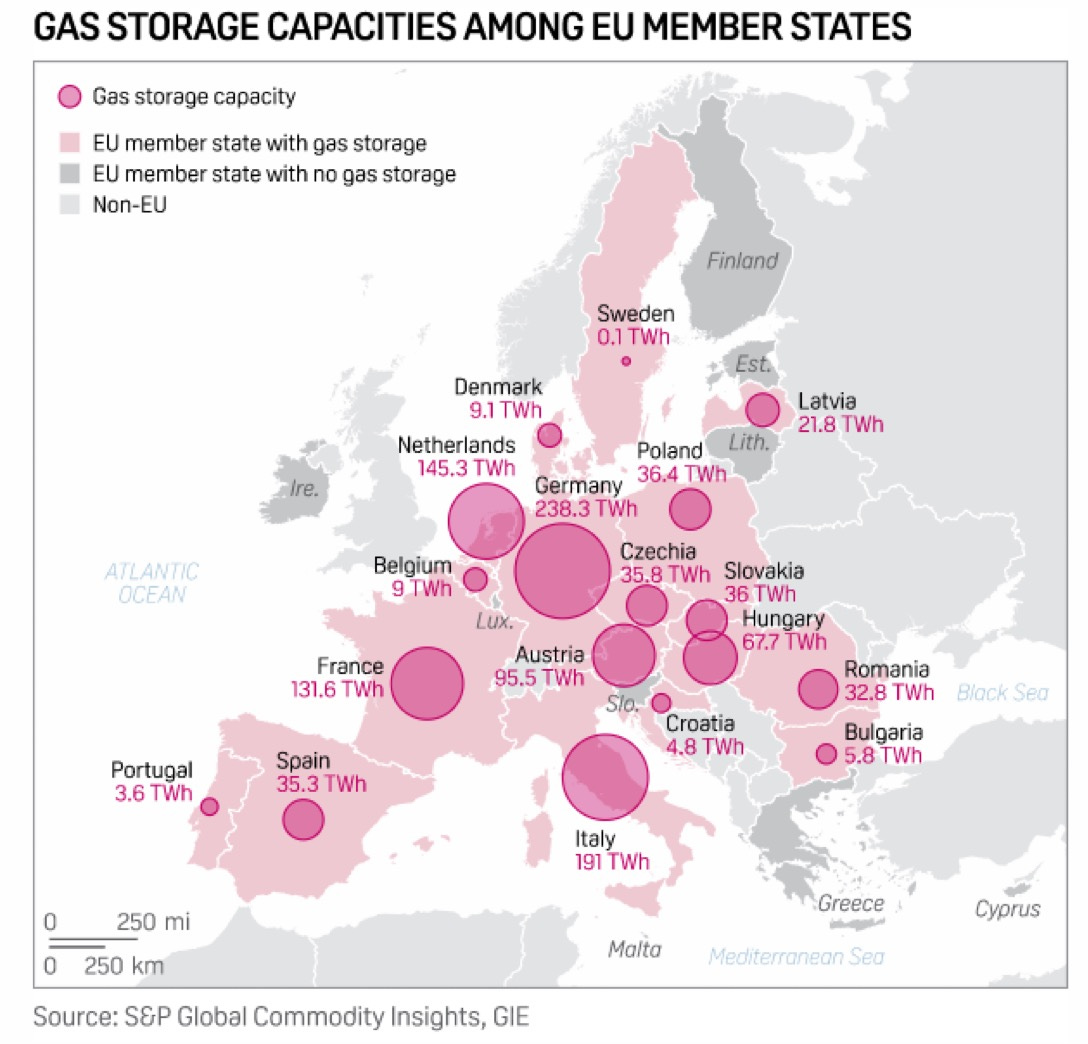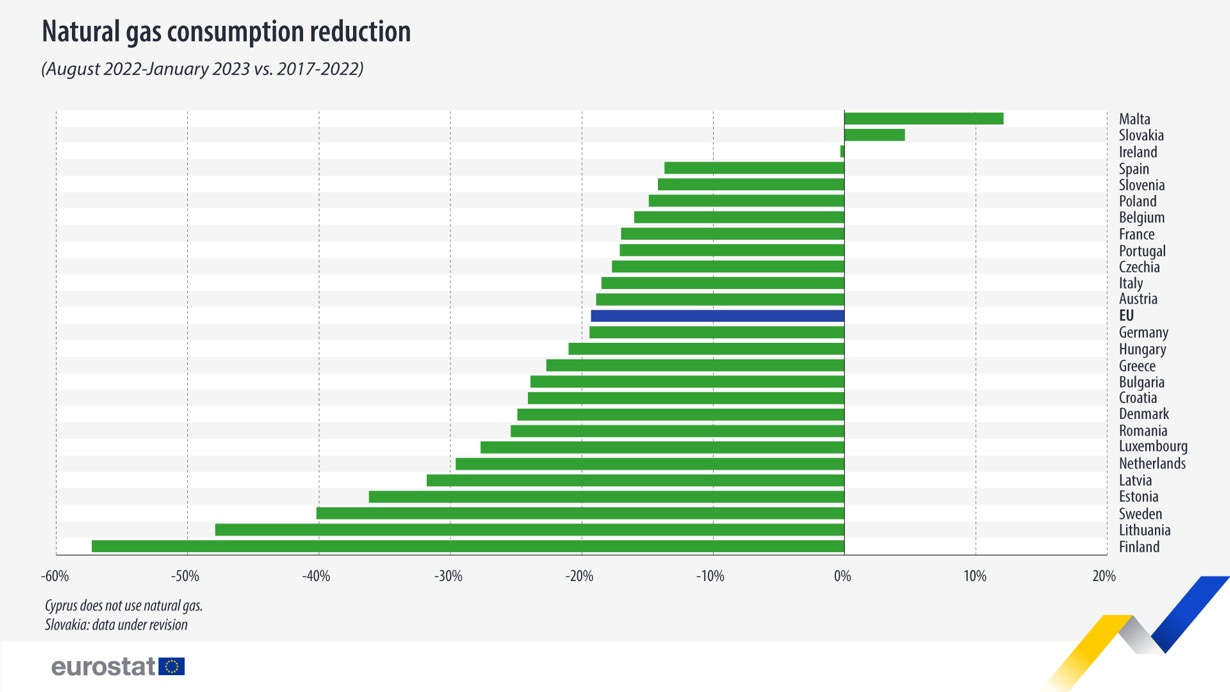🦠Pandemic🦠
🇩🇰
The Danish government has reached a deal with the five different regions on an emergency plan to get the country’s healthcare system back on track. Wait times have ballooned in Denmark as the system reels under an ever increasing load of postponed procedures built up over three years of the pandemic and made even worse by last year’s nursing strike.
Minister of the Interior and Health Sophie Løhde says that the agreement will reduce waiting times, strengthen emergency room care, and increase productivity in hospitals nationwide.
“Several of our hospitals are in a difficult situation, and we need to get them back on the right track so that patients can be treated more quickly and we ease the pressure on healthcare staff. And with the emergency plan for two billion kroner, we have a clear road map for how it will be concrete success. The emergency plan consists of a number of initiatives which together must contribute to the situation in our hospitals becoming noticeably better within a short number of years.”
Chairman of Danish Regions Anders Kühnau calls it a good agreement that will make a big difference.
“It will help reduce the waiting time for patients. We will, among other things, continue to work on a fairer distribution of shifts. It is important for the path we want our healthcare system to be on. It is also positive that it will be easier to hire foreign healthcare staff with the skills that are needed most.”
In a nutshell, the agreement broadens the ability for healthcare staff to be on call across several different staffing groups. It takes the emphasis off of administrative work and puts it on patient care. Training spaces for nurse anesthetists will be increased by 20% this year. It will also make getting foreign workers into Denmark easier to fill staffing needs across the healthcare sector. Language requirements will be eased, and a hiring task force will be established.
The government and the Danish regions have also built into the agreement a requirement to meet every quarter to assess progress on reducing the backlog of postponed procedures. And to see what is working and what is not in efforts to return the healthcare system to better than pre-pandemic levels.
-
In Denmark, COVID hospitalizations increased slightly last week, with 191 new admissions, up from 178 the week before. Daily hospitalization numbers (199) have crept upward (+1) while the number of severely infected people in an ICU (8) also inched upward (+1). Of those, the number on a ventilator (2) is unchanged day to day.
As has been the case for over a year, seniors 70 to 89 years old continue to make up the largest proportion of new coronavirus-related admissions.
Infection-related admissions to a psychiatric facility (47) also increased slightly (+1).
-
There was also a slight increase in the number of pandemic deaths last week, with 29 more lives lost to the virus, four more than the week before. The Statens Serum Institute says excess mortality “remains elevated” but appears to be decreasing. Seniors over the age of 85 continue to bear the brunt of COVID fatalities.
From Wednesday to Thursday, there was just one coronavirus death.
-
After three weeks of seeing increasing coronavirus activity, COVID wastewater sampling showed pretty much the same level of virus activity as the week before. Keep in mind Denmark has scaled back the number of wastewater sampling sites from 87 to 29.
-
Now for the much less reliable pandemic barometers. The Statens Serum Institute says the number of confirmed infections remained stable from one week to the next. Keeping in mind that Denmark’s testing rates have plummeted, making the country almost entirely blind to infection spread. The COVID incidence rate per 100,000 people went from 16 to 14 from week six to week seven. In its Thursday update, the SSI reported just 138 new infections, including 52 reinfections.
PCR testing numbers dropped by another 21% last week. On March 31, Denmark will mothball its once world-leading public COVID testing system.
The positivity percentage last week was 8.4%, up slightly from the previous week’s 7.9%. With a mere 1,614 PCR tests taken on Wednesday, the daily positivity percentage is 8.55%.
Looking at it by age, the highest number of new infections continues to be among seniors over the age of 80. The highest positivity percentage, 11%, was among those 50 to 59 years old.
While Denmark adopts a strategy of pretending the pandemic is over, life remains anything but typical for seniors and those in high-risk populations who continue to be in harm’s way. Among vulnerable seniors in care, the COVID incidence rate dropped from 63 cases per 100,000 to 45. But the positivity percentage jumped from 5.5% to 8.6%. Last week, six nursing home residents died from a coronavirus infection, one more than the week before.
-
As testing numbers in Denmark drop like a rock, it is getting much harder to get an even remotely accurate picture of COVID variant trends. The SSI says, based on what little testing and even less sequencing is being done, that the recombinant XBB, and its sub-strains, were now dominant making up 33.56% of sequenced positive tests last week. The XBB.1.5 variant makes up 29% of infections alone. Trailing just behind is the BA.2.75 variant (23.29%).
-
The Statens Serum Institute’s sentinel monitoring system shows that overall respiratory infection numbers dropped across Denmark last week. The three most commonly detected viruses were influenza, metapneumovirus, and adenovirus. Numbers are somewhat clouded because last week was winter holidays, so numbers are based on partially collected data from week six, while statistics from last week haven’t been calculated yet.
The institute says RS virus infections and hospitalizations continue to trend downward.
Last week, from what date has been gathered, influenza infections and related hospital admissions both decreased. Although that is not what the influenza chart the SSI updates daily seems to indicate.
🇸🇪
Sweden added 668 new infections (wildly underreported) and another 28 coronavirus deaths in its latest weekly report.
COVID hospitalizations (484) continued to ease (-29).
Of those 65 years old and older in Sweden, 82.1% have a 2nd booster dose.
🇳🇴
The Norwegian Institute of Public Health has not issued a pandemic update this week.
🇫🇮
In its latest weekly pandemic report, Finland registered 586 infections and 33 more virus deaths.
-
The influenza wave in Finland may have peaked, according to the Finnish Institute for Health. The agency says while the flu epidemic is still very much ongoing, the number of confirmed cases has begun to decrease. Since the beginning of October, Finland has registered more than 12,000 confirmed influenza infections. The institute says the vast majority, 96%, have been the influenza A strain.
Leading Expert Niina Ikonen:
“Influenza A(H3) viruses have been dominant viruses so far, but the peak of the epidemic has been passed for them. Based on visits to the health center due to an influenza-like illness, influenza activity has decreased. At the moment, activity is moderate almost throughout the country.”
About 60% of vulnerable seniors have had a flu shot this season in Finland, about the same number as last year. But vaccination uptake among children in dropping. The institute says just 37% of kids under the age of three received the special pediatric vaccine. The uptake was even worse for kids between three and six years old, just 27%.
Chief Physician Hanna Nohynek:
“The circulation of the influenza virus has been very low during the corona years, which may have somewhat reduced the interest of parents of young children in influenza vaccinations.”
The health agency estimates this year’s flu vaccine offers 41% protection against infection for seniors over 65 and 66% protection for children under seven. A level of protection the agency says is “reasonable.”
🇩🇪
Germany recorded 25,038 new infections and 113 more pandemic deaths in its daily Thursday report.
It added another 2,356 hospitalizations while ICU numbers (1,005) continued to head upward (+35). As a percentage of all intensive care beds in the country, coronavirus patients use 4.7%.
-
Germany has ended mandatory COVID testing requirements placed on all travelers arriving from China.
“Anyone entering Germany from China no longer has to present a rapid antigen test before departure. Since February 22, China has no longer been considered a virus variant area where a virus variant of concern is threatening to emerge.”
Germany isn’t just ending the requirement for a recent negative test to enter the country it is also ending random testing of incoming passengers as well.
🇫🇷
Chinese travelers arriving in France no longer need a recent negative COVID test to enter the country.
Statement from the French Embassy in Beijing:
“Travellers from China to France are no longer required to present the result of a negative PCR test within 48 hours or fill a health declaration form. Random screenings on arrival are also abolished.”
France had put the travel restriction in place in early January in response to China’s pandemic situation.
🇲🇹
As of Monday, February 27, Malta will also lift the requirement for a recent negative COVID test for all passengers arriving from China.
💉 🦠
Moderna had to throw out a lot of expired COVID vaccines last year. So much so that it took a big bite out of the company’s bottom line. According to the pharmaceutical giant’s annual accounts, it threw away expired mRNA COVID vaccines last year worth $1.7 billion Canadian. But, while taking an expensive bath on expired doses, which helped gouge a $5 billion dollar hole in its annual profits year over year, the company will be just fine as it still declared $11.3 billion in pure profit last year.
🇺🇸 💉 🦠
Misinformation kills. On the heels of a Canadian study showing a shocking number of preventable deaths were caused by vaccine misinformation, there are truly staggering numbers out of the United States. At the Conference on Retroviruses and Opportunistic Infections, attendees were told of the deadly cost when vaccine skepticism runs rampant, especially on social media.
Health Communications Professor Scott C. Ratzan said that a staggering 300,000 coronavirus-related deaths in the United States were preventable were it not for vaccine misinformation.
“Misinformation and disinformation kill, literally. Since the widespread availability of vaccines, half of U.S. COVID deaths were preventable. So, yes, this is a public health issue and problem. And information can make that difference! It's not just the message, but also who are the trusted and best messengers.”
But, what can be done to combat misinformation?
Dr. Emily Vraga says social media is a big source of misinformation. She says that 33% of vaccine information on social media is misinformation fueled to a great deal by political polarization. She suggests filling information voids to combat it, promoting the full weight of evidence, and what she called “prebunking.” This involves giving people the tools to recognize misinformation and back away when confronted with it. Also important is debunking by responding quickly with facts.
🇨🇦
In its latest weekly update, the Public Health Agency of Canada recorded 10,386 new infections while suffering the loss of another 152 lives to the virus. The total to date pandemic death toll in Canada now exceeds 51,000 lives gone.
The weekly positivity percentage is 12%.
COVID hospitalizations trended downward across Canada. In the week ending February 21, the total number of hospital beds being used by a pandemic patient declined by 113 to 3,724 beds in use. COVID-related general admissions dropped by 112 to 3,544 occupied beds. Intensive care capacity went down as well but just slightly slipped from 171 beds in use to 170 from week to week. There were also six fewer people on a ventilator that week as numbers eased to 87.
⚡️Energy Crisis⚡️
🇪🇺
The weather across Europe wasn’t as cold last week, so the European Union didn’t have to dip as much into its natural gas reserves. Last week, temperatures across Europe were 2° to 6° Celsius above the seasonal average. As of February 18, EU gas reservoirs were at 64.1%, down slightly from the previous week’s 66.5%.
Gas reserves in France have sunk to 48.75%, the lowest among all EU nations. Two European countries now have natural gas reserves at 50%, Hungary (50.58%) and Romania (50.6%), while Belgium (53.92%) is getting close. This as we had a record-breaking winter heat wave in Europe.
Germany has one of the highest natural gas reserves in Europe, which is at 71.58%. Last week, it was able to end four consecutive weeks of exceeding gas use targets.
In the Netherlands, gas use has sunk to the lowest level in the last 50 years. Currently, its gas reserves sit at 64.13%. Last week, it had the lowest gas withdrawals among major European economies.
The European Union has already begun to work on gas storage for the coming winter knowing the energy crisis isn’t over and that the weather is not an ally that can be relied, on as it dodged a bullet this winter.
-
The European Union, and with a few exceptions, all EU nations, either met or surpassed the goal of reducing natural gas use by 15% this winter. With Russia weaponizing its energy exports to bludgeon the EU into submission over its support of Ukraine, it triggered an energy crisis and reducing gas use was one way to try and avoid feared gas shortages.
According to numbers from the European Statistics Agency, EuroStat, the EU reduced natural gas use compared to the five-year average by 19.3% from August 2022 until January of 2023. In the Nordics, Finland led all European Union countries by reducing natural gas use by a whopping 57.3%. Lithuania (-47.9%) and Sweden (-40.2%) rounded out the top three.
Malta, Slovakia, and Ireland fared the worst while Spain (-13.7%) and Slovenia (-14.2%) have yet to achieve the 15% reduction target.
🇩🇰
According to Statistics Denmark the number of unemployed people in Denmark declined slightly in December. It says 1,800 people found a job in December lush8 f total employment numbers in the country to 2,973,100 working people.
While unemployment goes down, the news is not so rosy for retail prices. Overall inflation has been declining in recent months, but Statistics Denmark says half of the Danish retailers expect to increase prizes over the next three months. 43% expect prices to remain “roughly unchanged”, while just 3% anticipate being able to knock some bucks off the sticker price.
🇫🇷
While the winter has been all about the energy crisis and the record-breaking heat wave that rescued Europe from possible energy shortfalls, the lack of snowfall is going to have its own impacts. Even though it is February, France’s Ministry of Sustainable Transition is warning about the likelihood of serious droughts to come.
Parts of France haven’t had rain or snowfall for 32 days, the driest stretch in the last 64 years. Sustainable Transition Minister Christophé Béchu is already warning that water restrictions could be coming even before the summer arrives. What those might be, he did not say.
Last summer, Europe saw one of the worst droughts in the last 500 years.
🇺🇦/ 🇷🇺 War
🇷🇺/ 🇺🇸 🇩🇰
Russian President Vladimir Putin doubled down on his disastrous invasion of Ukraine this week. In a speech that went well over an hour, Putin meandered through propaganda and misinformation about the war, blamed the west, went on about imaginary Nazis, and even found time to blast gay marriage. He also announced that Russia was suspending the “New Start” nuclear arms agreement. The nuclear arms reduction treaty is the last nuclear arms control pact between Russia and the United States.
Danish Institute for International Studies Senior Researcher Flemming Splidsboel calls the decision an escalation in the conflict between Russia and the West.
“It is interesting that Putin saved it for the end of his speech. It is the kind of ace he throws on the table to put pressure on the West, threatening to withdraw from this major agreement. We must see if they ultimately withdraw and the agreement completely falls apart. They risk restarting an [nuclear] arms race.”
🇩🇰/ 🇷🇺
The reaction from Denmark to Putin’s speech was blunt.
Acting Minister of Defence Troels Lund Poulsen said it was “crazy.”
“It is tragic to see. Not least because we know that it is Russia that is behind the aggression against Ukraine, it has invaded a peaceful country and is behind a huge massacre. Therefore, it seems extremely desperate when you give such a completely crazy speech. This must mean that we must remain united in Europe and show solidarity with Ukraine.. Because they are fighting for freedom.”
NATO/ 🇷🇺 🇨🇳
NATO Secretary General Jens Stoltenberg is urging Vladimir Putin to reconsider suspending the ‘New Start’ nuclear arms reduction treaty
“I am saddened by Russia's decision and strongly urge Russia to reconsider.”
Stoltenberg and US intelligence agencies have warned that China may be preparing to throw some serious military aid to Russia.
“[I feel a] growing unease that China may have plans to step in and support Russia with weapons in the war in Ukraine."
🇫🇮 🇸🇪 🇳🇴/ 🇺🇦
Turkey has signaled that it is ready to resume negotiations over Sweden and Finland’s NATO applications. This is a bit of a change in tone for Turkey, which seemed happy until now to delay any talks until well after its national elections. It may signal pressure is being applied behind closed doors by the United States and others.
NATO Secretary General Jens Stoltenberg says the three countries will meet at NATO headquarters in the middle of March to iron out their differences.
“I see progress. My aim is to have both Finland and Sweden as full members by the NATO summit.”
The summit is scheduled in Lithuania on July 11 and 12.
That said, Turkey continues to insist that to get its blessing to ratify the two Nordic NATO bids, a number of specific requirements must be met. However, Norway is the latest NATO member nation to throw its support behind its two Scandinavian neighbours, saying enough is enough.
Speaking to Swedish news outlet TT, Norwegian Prime Minister Jonas Gahr Støre says what Turkey is asking for lies outside NATO membership criteria. He says both Finland and Sweden have fulfilled all of their obligations.
“Turkey has set up its own unimportant criteria for approving Sweden and Finland’s membership into NATO. I don't think there is any country in history that has applied for NATO membership that has met the criteria in the way that Sweden and Finland have done. It is my request that they should be approved without delay. And other themes that are outside the criteria for membership must not interfere with it.”
28 out of the 30 NATO member nations have delivered lightning-fast ratification votes saying yes to Finland and Sweden. Only Hungary and Turkey continue to drag their heels.
🇭🇺/ 🇸🇪 🇫🇮
Hungary will hold a ratification vote on Sweden and Finland’s NATO applications next month. Another sign of a rapidly evolving situation behind the scenes.
🇸🇪/ 🇷🇺
Sweden’s intelligence service warned this week that the current security situation had accelerated the threat against the country. SÄPO says the biggest risks to Sweden’s security are a more aggressive Russia, growing right-wing extremism, and an increased threat of attack. It also warned that Sweden’s entities are not doing enough to protect themselves from online threats and that sensitive information on things like the country’s defensive capabilities “is at risk of being compromised.”
🇫🇮/ 🇺🇦
Finland is sending three Leopard 2 mine-clearing tanks to Ukraine as part of its latest batch of military supplies to help Ukraine fend off the Russian invasion. This is the 13th weapons package Finland has sent Ukraine to date.
Acting Finnish Defense Minister Mikko Savola says the package includes training on using the tanks and their maintenance.
“A year has passed since the beginning of the Russian attack, and Ukraine still needs support to defend itself. We are sending more defense material and participating in the Leopard [tank] cooperative together with our partners.”
According to the Finnish Defense Ministry the latest weapons shipment is valued at over €160 million. As is customary for Finland, they are not revealing any other details about the package.
🇩🇰/ 🇵🇱
The Prime Minister of Poland met with his Danish counterpart Thursday in Copenhagen. Mette Frederiksen and Mateusz Morawiecki discussed the war and continued support for Ukraine.
Mette Frederiksen:
“We must increase the pace of our financial support and, above all, the military aid. We need more donations and to work closely together to ensure that they have what they need.”
Mateusz Morawiecki:
“Ukraine must win the war; Russia must be defeated. There is a semantic difference that Ukraine must be defended and not lose. We are convinced that Ukraine will win because this is the only way we can create lasting peace, which is the prerequisite for development.”
🇪🇸/ 🇺🇦
Spain will send at least six Leopard 2A4 tanks to Ukraine. But the defense ministry says that number could increase. The tanks must be repaired and retrofitted before they can be dispatched to join the fight against Russia.
🇩🇰/ 🇷🇺 🇧🇾
The International Olympic Committee continues to hedge its bets on whether athletes from Belarus and Russia can compete in the 2024 Summer games in Paris. This week Denmark and 30 other countries issued a statement opposing the move. The IOC issued a written response saying it has “noted” the opposing views.
“The IOC appreciates the constructive questions when it comes to defining the neutrality of athletes with a Russian or Belarusian passport. However, explicit human rights concerns are not addressed in the statement. Only those who have not acted against the IOC's peace mission by actively supporting the war in Ukraine can compete. Individual checks must be carried out for all registered athletes.”
It refers to December’s meeting, where guidelines were established to allow Russian and Belarusian athletes to compete under a neutral flag.
Denmark’s Culture Minister Jakob Engel-Schmidt says the IOC deserves a gold medal for avoiding direct answers.
“You cannot bomb civilian Ukrainians and at the same time expect to compete in the Olympics and win medals.”
🇨🇿/ 🇺🇦
The Czech Republic has remained, until now, very quiet about what military aid it has sent to Ukraine over the last year. Czech Prime Minister Petr Fiala revealed details after meeting with U.S. President Joe Biden this week. He says his country has sent, among other things, 89 tanks, 226 armoured vehicles, 38 howitzers, 33 rocket launchers, six air defense systems, and four helicopters.
🇺🇸/ 🇷🇺
As the European Union continues to negotiate a 10th package of sanctions against Russia, the United States will table another round of its own sanctions on Friday. White House's press secretary Karine Jean-Pierre says the sanctions will target Russian banks, Russia's defense, and the tech sector.
At the same time, the U.S. will announce another package of financial aid for Ukraine.
🌎/ 🇷🇺
In a largely symbolic vote, the United Nations passed a non-binding resolution on Thursday that Russia must end all hostilities and withdraw its forces from Ukraine. The resolution also called for a "comprehensive, just and lasting peace" in Ukraine. It was passed with a majority of support, with 141 countries voting in favor while just seven countries, Russia, Belarus, North Korea, Eritrea, Mali, Nicaragua, and Syria voted no. 32 countries didn’t cast a ballot either way, including China and India.
🇬🇧/ 🇺🇦
As EU countries work on getting Leopard tanks to Ukraine, the United Kingdom is working on getting British Challenger tanks into Ukrainian hands. UK Defense Minister Ben Wallace told Reuters the tanks should arrive in Ukraine “this spring”, but he wouldn’t specify exactly when the more modern tanks will arrive.
Also, Britain is increasing artillery shell production to ensure that Ukrainian forces have a steady supply of ammunition.
-
Ukraine has not one but two former British Prime Ministers on its side as it argues for countries to donate more modern fighter jets.
Former Prime Minister Boris Johnson spoke in the House of Commons:
“Give them the planes. We should give them what they need, not next month, not next year, but now.”
Also throwing her support behind getting newer fighter jets to Ukraine was the woman who ever so briefly replaced Johnson at 10 Downing Street, Liz Truss:
“We have to do everything we can to ensure that Ukraine wins this war as quickly as possible.”




